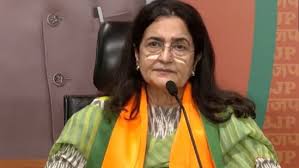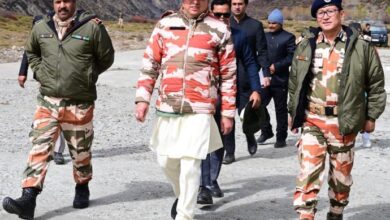Haryana Congress heading for turmoil in the run up to state assembly polls

Haryana Congress heading for turmoil in the run up to state assembly polls
S.M.A.KAZMI
Dehradun, June 19
The euphoria of comeback of Congress party in Harayana after winning five Lok Sabha seats in the recently concluded Lok Sabha elections could be short lived as Bhupender Singh Hooda, former Chief Minister who played a dominant role in the state Congress party in going to face formidable challenge from his detractors from within the party in the run up to the state assembly elections coming soon. The entry of daughter –in- law of former Chief Minister and veteran Congress leader Bansi Lal, Kiran Chaudhary and her daughter Shruti in BJP is a signal of the forthcoming political developments in the state Congress unit. Shruti, a former MP is one of the four working presidents of the state Congress while Kiran Chaudhary, wife of Surender Singh, son of Bansi Lal is a four time legislator from Tosham in Bhiwani district, a seat nurtured by her father-in-law. Kiran Chaudhary was a legislator in Delhi but shifted to Haryana politics following the death of her husband Surender Singh in a chopper crash in Saharanpur district of Uttara Pradesh in 2005. He was then a minister in Bhupender Singh Hooda led government.
Kiran Chaudhary who was miffed after her daughter Shruti was ignored from Bhiwani –Mahendargarh Lok Sabha seat by Congress. Congress had fielded Rao Dan Singh, a Hooda loyalist, who lost the elections. In her resignation letter to Congress President Mallikarjun Kharge, Kiran Chaudhary lamented that Congress is being run as a personal fiefdom leaving no space for sincere voice like her, who she alleged has been stifled, humiliated and conspired against in a most well orchestrated and systematic manner. “The Congress in haryanahas unfourtunetaley become one-person-centric who has compromised the interest of the party for his selfish and petty interests and it is,thustime for me to move on so that I may continue to uphold the interest of my people and the values that i stand for.” It was the most serious open indictment of the father son duo of Bhupender Singh Hooda- Deepender Singh Hooda and their style of politics.

Interestingly, the Hooda camp is going to face challenge from his rival camp which has many senior leaders who do not see eye to eye with senior Hooda and are licking their wounds which hooda camp inflicted on them in the Lok Sabha polls. These leaders namely Kumari Selja, who won from Sirsa seat and general secretary incharge of Uttarakhand is a bitter vocal critic of Hooda’s. She has made her intent clear to challenge the leadership of Bhupender Singh Hooda. Others who are also opposed to Hooda camp are Randeep Singh Surjewala, a close aide of Rahul Gandhi, and Birender Singh, another senior leader who rejoined Congress before Lok sabha elections along with his son Brijender Singh, former BJP MP from Hisar. Birender Singh, a grandson of veteran Jat leader Sir Chottu Ram is cousin of Bhupender Singh Hooda and is even senior to him in Congress party but had left Congress to join BJP after being ignored at the behest of Hooda in Haryana Congress. He was Union minister in the first Modi government from 2014 but in 2019 managed a BJP ticket for his son Brijender Singh, a former bureaucrat from Hisar. But, despite quitting BJP in the hope of getting a Congress party nomination, Hooda prevailed in ticket distribution by denying him the ticket. Both father-son duo of Birender-Brijender are actively working for state assembly polls.
Kumari Selja has also been vocal against the role played by Bhupender Singh Hooda in giving party nominations. There are allegations that Hooda deliberately choose a weak Congress candidate film star Raj Babbar, a rank outsider against Rao Inderjit in a tacit understanding to ensure that Rao Inderjit would help Deepender Singh Hooda to win from Rohtak by not campaigning in Ahir dominated belt of Kosali in Rohtak constituency. In the earlier Lok Sabha elections of 2019, Deepender Singh Hooda trailed by a huge margin in that Ahir belt. This time Rao Inderjit did not campaign in the area and Deepender Singh Hooda was ahead by few votes against BJP candidate. Not only the choice of Raj Babber but candidature of Satpal Brahmchari, a swami from Haridwar who was fielded by Hooda but won by a margin of 20,000 also drew criticism. Satpal Brahmchari, a swami running an ashram at Haridwar had been trying for a Congress ticket from Uttarakhand but did not succeed all these years but this time hailing originally from a village in Sonipat in Haryana, he was put up by Hooda. Being a rank outsider in Haryana politics this has also invited criticism. Hooda detractors point out that there were many other senior party leaders who could have been fielded instead of bringing in outsiders like Satpal Brahmchari and Raj Babbar in a spirit of accommodation. But Hooda who along with Deepak Babaria, general secretary incharge decided to bulldoze his way in ticket distribution.

The Congress maintained lead in 46 assembly segments while the BJP was close second with lead in 44 segments in the Lok Sabha polls pointing towards the facts that it would be an interesting contest for the forthcoming assembly polls. The BJP after losing five Lok Sabha seats with its’ vast resources has been working hard to bridge the gaps with its’ social engineering. There is talk of bringing back Ram Bilas Sharma, a senior BJP leader as Haryana BJP chief as part of the exercise. Already, with Manohar lal Khattar, a Punjabi as Karnal MP and Union minister and Nayab Singh Saini, a OBC, the BJP has been actively working on the ground. On the other hand Congress leaders are bitterly fighting amongst themselves.
Close on the heels of Kiran Chaudhary exit, there are rumors of some other party leaders quitting a joining the saffron bandwagon ahead of assembly polls. Dharamvir Choker, a close Hooda aide, who with his son are facing charges, Kuldeep Sharma, a son of senior party leader Chiranji Lal Sharma, could join the BJP. Kuldeep Sharma, a close relative of Venod Sharma, whose son is a Rajya Sabha MP with BJP support did not campaign for party candidate in the Lok Sabha polls.
It would be a uphill task for the central party leadership particularly Rahul Gandhi to balance the aspirations of the contending camps in the Haryana Congress to put up a united fight against the BJP/RSS juggernaut in the upcoming state assembly elections later this year.




